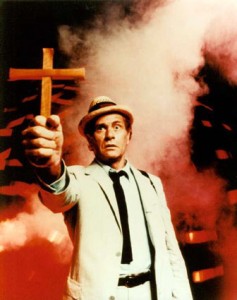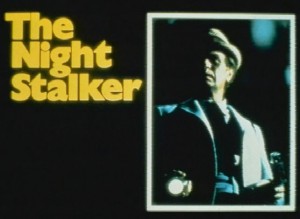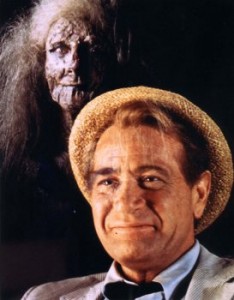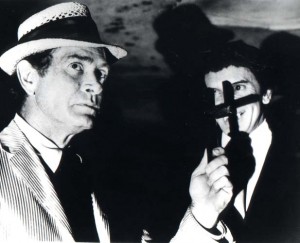 One of the enjoyable memories of frights for monster kids of the 1970s was Carl Kolchak who filled the role of The Night Stalker. Each week he used his journalistic skills and savvy to research the paranormal and the monstrous. I was privileged to learn more about this great series through an interview with Mark Dawidziak, author of The Night Stalker Companion: A 25th Anniversary Tribute (Pomegranate Press, 1997).
One of the enjoyable memories of frights for monster kids of the 1970s was Carl Kolchak who filled the role of The Night Stalker. Each week he used his journalistic skills and savvy to research the paranormal and the monstrous. I was privileged to learn more about this great series through an interview with Mark Dawidziak, author of The Night Stalker Companion: A 25th Anniversary Tribute (Pomegranate Press, 1997).
Mark has been a theater, film and television critic for thirty years. He has been the TV critic at the Cleveland Plain Dealer since July of 1999. During his fifteen years at the Akron Beacon Journal, he held such posts as TV columnist, movie critic and critic-at-large.
Also an author and playwright, his many books include the 1994 horror novel Grave Secrets and two acclaimed non-fiction studies of the Carl Kolchak character played by Darren McGavin on television: Night Stalking (1991) and The Night Stalker Companion. His 11th book, published in 2008, is The Bedside, Bathtub, & Armchair Companion to Dracula. His first book, The Barter Theatre Story: Love Made Visible (1982), contains an entire chapter on the ghosts of America’s most haunted theater.
Several of his essays and introductions appear in Richard Matheson’s Kolchak Scripts (2003) and Bloodlines: Richard Matheson’s Dracula, I Am Legend, and Other Vampire Stories (2006), two books he edited for Gauntlet Press. He also contributed the career overview to Produced and Directed by Dan Curtis, a 2004 book about the horror auteur who created Dark Shadows.
His work on the horror side of the street also includes short stories and comic book scripts. He is the creative consultant to Moonstone’s comic book series Kolchak: The Night Stalker. And he has been a featured guest at such gatherings as FrightVision, GhoulardiFest, LaGrangeCon and the Dark Shadows Festival.
Mark and I recently reflected on the Kolchak: The Night Stalker series in a telephone interview.
TheoFantastique: Recently I have been doing some research and reflection on horror and thrillers on television in the 1970s, and during this process I came across your book on The Night Stalker. How did you get involved in writing on horror in general, and specifically, how did you come to focus on a book on The Night Stalker.
Mark Dawidziak: It’s really the collision of two different things. I grew up as a horror fan in the 1960s in the New York area. So I was watching the Universal horror films, and if you remember that era, it really was not a boom time for horror. The 1950s was a boom era where you have Robert Bloch, Ray Bradbury, and Richard Matheson bringing exciting things to print, and you had a horror boom in film between science fiction and drive-ins and 3D. There was a lot going on in the 1950s. You get to the 1960s and there’s kind of this lull between that and the horror boom that hit in the 1970s. You’ve got John Carpenter, Stephen King, and Anne Rice up and running and horror becomes big again in the 1970s. But if you grew up in the 1960s like me there were a few things that kept horror going. And if you talk to someone who grew up as a horror fan in this period you’re going to find the same kinds of influences, because what kept things going, the reason we’re having this conversation now, was Famous Monsters of Filmland magazine, Hammer horror films, and to a certain extent on television The Twilight Zone and Dark Shadows. These kept everything going. Today we take this vampire stuff for granted because it’s coming at us from every corner of the pop culture landscape, but back then when something came along it came from one direction and everybody knew about it.
So toward the end of 1971 we started seeing commercials for this thing called The Night Stalker. ABC was going to air it. And the ads for this thing, the commercials were great. They had you hooked. Everybody wanted to see this. It set a ratings record for TV movies. People were, if you’ll excuse the expression, dying to see it. So The Night Stalker came about for me when I was fifteen. It was a very good age. I had already grown up on the Universal horror films, the Famous Monsters of Filmland, Hammer Films and Christopher Lee, so I was primed for this. I was probably fan number one and ready to receive it. Then I got Jeff Rice’s book when it was published by Pocket Books, I watched the sequel The Night Strangler.
I graduated high school in 1974, started journalism school that fall, went to George Washington University majoring in journalism. Journalism school’s were doing boom business at this time because everyone wanted to do expose journalism like in Watergate. My idea of a good reporter was now Woodward or Bernstein, it was Carl Kolchak. He was my idea of what a reporter should be. In many ways he was the reason I got into journalism in the first place. So I had this collision of being a horror fan and my chosen occupation of being a journalist.
But none of this meant I was going to write a book on this. But that happened purely by circumstance. I had written a book in 1989 on the Columbo series. In the 1980s if you had asked me if I could write a book on one television series and what would it be, I would have told you hands down The Twilight Zone, my favorite television series of all time. Unfortunately, Mark Scott Zicree beat me two it. And dang him he did a good job too. He did a brilliant job and in some ways he set the standard for what books about television studies should be with The Twilight Zone Companion. So I went to my second choice in terms of great television and that was Columbo, because I was also a big mystery fan, and I think Columbo was television’s best mystery series. The book was well received. After the book came out a publisher called me who had a publishing house in New York and he said he was a big fan of my Columbo book and he asked if I ever thought of doing that kind of book on The Night Stalker. I said I’d love to that kind of book but I didn’t know there was a publisher crazy enough to do it. I told him I was crazy enough to write it, and so that’s how the first version of the book came about.
I wouldn’t have thought there was enough of an audience, I didn’t think there were enough people like me out there to like The Night Stalker. Columbo was big, it ran, if you count the original television movies, for ten years. It is a chunk of television history that spans from 1968-1978, some of the greatest guest stars of all time, and Peter Falk won three Emmys for playing that part. You’re talking about a big chunk of television history. With The Night Stalker I didn’t think there would be that many people like me where the series had that kind of impact on them. I thought it was kind of a private affection. So when the publisher suggested I do this book I told him I’d do it under one condition: if I can get Darren McGavin, Jeff Rice, Dan Curtis, and Richard Matheson to agree to cooperate with the book I’ll do it. But if I don’t get all four I won’t have the necessary background to write the book. All four said they would do it and so Night Stalking was published in 1991. That did well enough that Jeff Rice asked me to write the first original Kolchak novel in twenty years, which I did, so in 1994 that was published as The Kolchak Papers: Grave Secrets, and then a couple of years later I revised and reworked all The Night Stalker material. I always say if you want to learn about something write a book about it. I don’t mean write a book and learn about it as you research it. I mean after it’s published everybody will come out of the woodwork and tell you what you did wrong. Few writers are lucky enough to go back and write another edition. So I was luck enough to go back and create a new edition, and that’s the one you found, the 1997 book, The Night Stalker Companion.
 TheoFantastique: As a kid I don’t know if I saw the first television movie incarnations of this story. I certainly remember the series. How did the series, Kolchak: The Night Stalker, come to be?
TheoFantastique: As a kid I don’t know if I saw the first television movie incarnations of this story. I certainly remember the series. How did the series, Kolchak: The Night Stalker, come to be?
Mark Dawidziak: They were going to do a third movie. The original two movies had done very well. The Night Strangler, the second movie, was received almost as well The Night Stalker. The third movie did not come about for two reasons: one was Universal’s desire to do a series, and two, Darren McGavin didn’t like the script. He thought the third script was repetitive of the first two movies. On top of this he and Dan Curtis got into a terrible fight at the end of The Night Strangler, and this is documented in my book and both admitted it as such. They weren’t talking to each other at that point, and they later patched it up. So Universal wanted to do it as a series, and they approached Darren about it in this way. It was quite a mess. Darren wanted to be the executive producer on the series, and acted like he was, but he wasn’t. That created a conflict right from the beginning. As I often point out to people, if everything had gone creatively right on The Night Stalker 1974-75 series, it still probably would have failed, because it was on ABC at a point when it was in the toilet. And on Friday nights they were very competitive on television, and The Night Stalker was up against the number one and two series of that year, Sanford and Son and Chico and the Man. They would have been destroyed anyway. There was no guarantee of success in prime time. Even if every one of these episodes had been a gem they still probably would have gone down in flames.
You had very few people working on The Night Stalker who understood horror. You had Jimmy Sangster who had written for Hammer horror and who wrote “Horror in the Heights,” considered one of the best episodes of the series, you had a couple of people who understood horror, and a lot of young writers like David Chase who would later write for the Sopranos, and Robert Zemeckis worked as a writer for the series. There was a kind of collision between of the Universal establishment and these young writers on the first rung of the Hollywood ladder at that point. It ended up creating some very fine episodes. There are a couple that are really, really good. I always say if the series had to stake its claim on two episodes it would be the “Horror in the Heights” and “The Spanish Moss Murders.” I think these episodes hold up very well today.
TheoFantastique: I noticed on Amazon.com they’ve got the whole collection of episodes on DVD so I’ll have to add that to my Wish List.
Mark Dawidziak: What’s interesting is that these things were never meant to be seen on DVD. The video quality of DVD is so good that you can see things watching it now that you could never have seen watching it on a tinny old television set when it first aired in the 1970s. The episode that everybody goes to in order to demonstrate how silly the series could get, and it’s not really fair, is the episode where Bob Zemeckis and Bob Gale are the co-authors, is “Chopper.” It’s about a headless biker that goes around killing everyone. If you were going to do this story today about supernaturalism you could make this look very good with computer-generated imagery. But back then the only way to do it was to put a stuntman on a motorcycle and lift his leather jacket over his head on a block that you put up to cover his head, and it looked phony as anything. It does look awful, but they were under terrible time and budget constraints, and they were doing monster of the week, one of the hardest forms to do. The very fine mystery writer, John D. McDonald, once said very wisely, and I think I agree with him, the two hardest forms of television to do are humor and horror. Essentially he said that in the wrong hands humor becomes horror and horror becomes humor. He’s exactly right, which is exactly why there are so few people who work in them. The Night Stalker as a series, and the movies to a certain extent, tried to do both. So it tried to be funny and scary at the same time, and sometimes it pulled it off, which is pretty remarkable when you think of it.
TheoFantastique: What was the significance of Darren McGavin for the role of Carl Kolchak and the series?
 Mark Dawidziak: You can’t overstate Darren’s significance in all of this. I can’t see anybody else playing that part. He brought a life and vitality. Darren never phoned anything in. He could make any role sit up and dance, and he was a very underestimated actor. He got stuck in the television movie ghetto in the late 1960s and early 1970s, he was the go to go. And at that he managed some sublime performances. If you want to know how good an actor Darren McGavin is watch Tribes, A Christmas Story, and The Night Stalker back to back, and watch those three performances and you’ll see how many arrows this guy’s got in his quiver.
Mark Dawidziak: You can’t overstate Darren’s significance in all of this. I can’t see anybody else playing that part. He brought a life and vitality. Darren never phoned anything in. He could make any role sit up and dance, and he was a very underestimated actor. He got stuck in the television movie ghetto in the late 1960s and early 1970s, he was the go to go. And at that he managed some sublime performances. If you want to know how good an actor Darren McGavin is watch Tribes, A Christmas Story, and The Night Stalker back to back, and watch those three performances and you’ll see how many arrows this guy’s got in his quiver.
It’s odd that the two books I wrote are on Columbo and The Night Stalker. They are both examples of the ideal marriage of the perfect actor and the character. It’s very difficult to imagine anybody else in that raincoat than Peter Falk, and it’s very difficult to imagine anybody else in the seersucker suit than Darren. Darren also came up with the costume, which is big because it gave Kolchak a uniform. After Darren made the choice of the seersucker suit, the straw hat and sneakers that became Kolchak’s uniform. So Darren brought not only a face, and a vitality, but a costume.
He also had the ability to play someone intensely human. Kolchak is interesting not because he is incredibly courageous, and he shows fear in almost every episode, but it’s always overcoming that panic and fear. That makes him someone we can relate to. We relate more to that than we do the square jawed hero who has an answer for everything, which is what most action movies give us. Kolchak is an intensely human character. The other thing Darren brought to this was that he had a face that looked like it had been kicked in a few times. You believed that more than anything else for Kolchak. Life has not treated Carl very well. Carl is the guy we can count on to track down all the monsters out there for an ungrateful humanity. The reward for that is usually a swift kick in the teeth. So you have to have an actor that looks like he’s had his face punched in a few times. Darren had that. He made you believe he had been roughed up a few times emotionally, psychologically, and physically. All of that came through in his performance.
TheoFantastique: One final question for you, Mark. What’s been the impact and continuing legacy for this series?
 Mark Dawidziak: I think the amazing thing about this series is that if you came of age in the 1960s and early 1070s then everybody was watching the same things and everybody was influenced by and warped by the same things. I think because of that the generation of filmmakers that came up after that were strongly influence by The Night Stalker. If you don’t have The Night Stalker you don’t have The X-Files, you don’t have Buffy the Vampire Slayer and therefore you don’t have Angel, you don’t have Men in Black and a lot of the things that acknowledge the influence of The Night Stalker. Probably the biggest of these is The X-Files. This was the very first genre show, the first horror, science fiction, fantasy show which consistently made the top twenty at a time when cable had started to fracture the audience. In order to make the top twenty you had to have a significant part of the population watching. The X-Files is an extremely important show, and Chris Carter has repeated in virtually every interview he has given he has said he created The X-Files because as a kid he was scared by The Night Stalker and this was an attempt to do the same kind of program for his generation. I don’t know if there has ever been a show that was more visually important to storytelling than The X-Files. This changed a lot of how television was made visually. It doesn’t get the credit for that, but after The X-Files it’s virtually impossible to see a show filmed in the same way again. It changed all the rules. You don’t have that without The Night Stalker.
Mark Dawidziak: I think the amazing thing about this series is that if you came of age in the 1960s and early 1070s then everybody was watching the same things and everybody was influenced by and warped by the same things. I think because of that the generation of filmmakers that came up after that were strongly influence by The Night Stalker. If you don’t have The Night Stalker you don’t have The X-Files, you don’t have Buffy the Vampire Slayer and therefore you don’t have Angel, you don’t have Men in Black and a lot of the things that acknowledge the influence of The Night Stalker. Probably the biggest of these is The X-Files. This was the very first genre show, the first horror, science fiction, fantasy show which consistently made the top twenty at a time when cable had started to fracture the audience. In order to make the top twenty you had to have a significant part of the population watching. The X-Files is an extremely important show, and Chris Carter has repeated in virtually every interview he has given he has said he created The X-Files because as a kid he was scared by The Night Stalker and this was an attempt to do the same kind of program for his generation. I don’t know if there has ever been a show that was more visually important to storytelling than The X-Files. This changed a lot of how television was made visually. It doesn’t get the credit for that, but after The X-Files it’s virtually impossible to see a show filmed in the same way again. It changed all the rules. You don’t have that without The Night Stalker.
And this makes the point that The Night Stalker is not so important in and of itself. I hope that people will discover Kolchak and The Night Stalker, and that they will fall under his spell, but he’s not so important in terms of an individual and a franchise so much as what you’re asking me about, the influence he’s had which far outstrips the success of the two television movies and the series. That influence rolls into the 1980s and 1990s and into the new century. It is profound and it is everywhere today. You talk to people who do this and a lot of them were influenced by The Night Stalker.
TheoFantastique: Your passion for the subject matter is clear and that’s fantastic.
Mark Dawidziak: The great thing about The Night Stalker is that it kind of allowed me to pursue my interest in horror as a writer which wasn’t going to happen until that point because I was a journalist, a critic, I did a book of theater history, I did a book on the Columbo series, so I was really on track to be the mystery guy even though I was raised more under the shadow of horror. The Night Stalker allowed me to vent that side and vent that side since 1991 when the first Night Stalker book came out, and since then a frightening number of my books have monster, vampire, Kolchak connections, and happily so. My last book was a history of the Dracula character. I’ve gotten to write horror fiction and comic books. None of that would have been possible if it wasn’t for Carl Kolchak. So I am deeply in his debt. He’s been an awfully good friend to me. So that’s why the passion comes through. So anything I can do for Carl to repay my debt for what he’s done for me I’m going to do.
TheoFantastique: Mark, I appreciate you taking the time to share your thoughts and time and expertise.
Mark Dawidziak: It’s my pleasure. If you want to revisit this at any point, or any horror topic that comes your way give me a call.





There are no responses yet